Diaper Blowout Basics: Everything a Parent Needs to Know
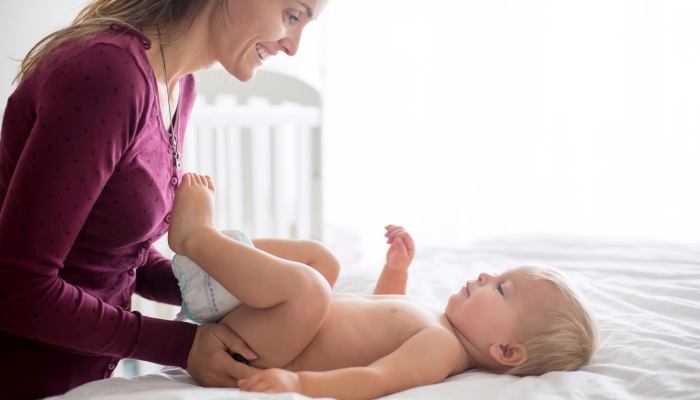
- Diaper blowouts are unpleasant and inconvenient, but they aren’t usually a cause for concern.
- Diaper blowouts happen because of incorrect diaper fit or size or lack of absorbency.
- You can’t prevent the occasional poop explosion, but if you’re prepared, you can deal with it like a pro.
Every parent or caregiver has to deal with a diaper blowout at one time or another. Sometimes it happens at home. Sometimes it happens in public. One minute, your baby is happy, clean, and dry—the next minute, they’re covered in poop from neck to ankle, their clothes are stained, and you don’t know where to begin dealing with the mess.
Baby diaper blowouts aren’t fun, but it happens to everyone. And while there’s no sure-fire way to prevent baby diaper blowouts from happening, you can at least be prepared to handle them.
What is a Diaper Blowout?
Baby diaper blowouts often happen with infants and young babies whose poop is still quite liquid and loose. A “baby blowout” or “poop explosion,” as it’s also known, refers to extensive diaper leakage.
When your baby has a diaper blowout, poop comes out of the diaper and covers their back, legs, and sometimes even their belly. It usually also covers any clothing they’re wearing. You’ll need to check any surface they’re sitting or lying on, like a car seat or stroller, as these can get covered too.
Parents and caregivers are horrified when this happens, especially in public. It feels like poop is just everywhere—on clothes, shoes, toys, the blanket, and even you. But, while it creates some unsightly laundry, a diaper blowout is not generally harmful to your baby.
Why Do Diaper Blowouts Happen?
The main reason diapers leak is that they’re the wrong size. Your baby may have moved up a size without you realizing it. When this happens, their current diapers may just be too small to contain their bowel movements. Or the opposite may be true—your baby’s diapers could be too big. This may cause gaps and allow leaks, especially around the diaper cuffs.
The type of diaper your child wears could also be causing their diaper blowouts. Maybe you have an active baby who needs more flexible diapers that fit them snugly while they move. Or it may be that certain brands of diapers fit your baby’s body better than others, or that you moved from diapers to pull-ups too soon.
Yet another reason diaper blowouts happen is the absorbency of the diaper. If your baby’s diaper is already full, it just may not be able to handle anything else without leaking. You may want to try changing your baby’s wet diapers more frequently to avoid diaper blowouts.
Diaper blowouts tend to happen less with cloth diapers than disposable diapers because they are made from a more absorbent material. You may want to try cloth diapers or a different brand or size of disposable diapers to lessen the impact of the dreaded baby blowout.
Do Blowouts Mean Diarrhea?
For parents experiencing blowouts for the first time, it’s important to remember that while they are unpleasant, they are not a cause for alarm. A diaper blowout does not necessarily mean that your child has diarrhea.
Newborns and young babies have frequent bowel movements and their stool is often more liquid and loose until they start eating solids. So baby diaper blowouts are more likely to indicate that a diaper is already too full of liquid or that it doesn’t fit well, rather than that a baby is sick.
Young babies up to six weeks old will have at least three to four bowel movements a day and breastfed babies may have up to twelve. After two months of age, most babies will have one to two bowel movements a day.
Signs of diarrhea in babies include:
- A sudden change in the frequency or consistency of bowel movements for three movements or more.
- Blood or mucus in the stool or a bad smell.
- A child who has other signs of illness like fever.
If you see a sudden change in your baby’s stool and they have other signs of sickness, it may be diarrhea. If you suspect your baby has diarrhea, call their pediatrician for advice.
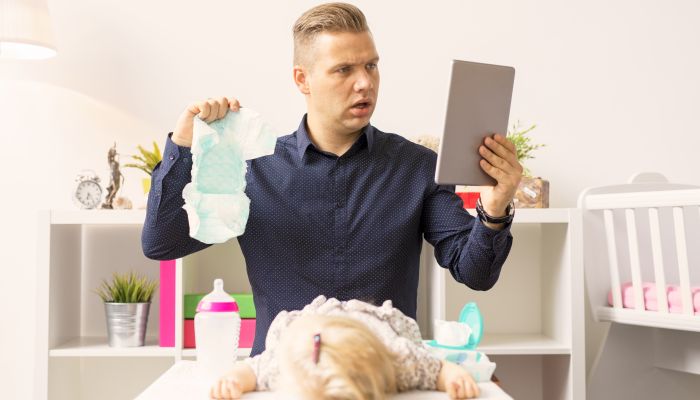
How To Prevent Diaper Blowouts
The most important key to preventing diaper blowouts is to accept the fact that, unfortunately, you can’t! Diaper blowouts are an inevitable part of taking care of a young baby.
Rest assured, you will not be alone in the experience of having to change a poopy diaper in a public restroom with a plastic bag of soiled clothes on the floor and a (loud) wriggling baby on the changing table.
But once you accept that diaper blowouts will happen, you can make sure that you’re prepared for them by doing the following:
- Check that your baby’s diaper fits.
Babies grow and change so quickly. Experiment with different diaper brands and try different diaper sizes. Make sure your baby is in the right diaper for their weight range.
Check that the diaper is fastened snugly around your baby’s waist and legs. Make sure that leg ruffles are pulled out on the leg cuffs to help with the fit and prevent leaks. You’ll know it’s a snug fit if you can’t fit more than one finger around your baby’s waist.
- Change your baby’s diaper frequently.
If your baby’s wet diapers are changed more frequently, they’ll be able to contain your baby’s poop and hopefully prevent a diaper blowout.
- Use an envelope onesie.
An envelope onesie has shoulders that allow you to pull it down off your baby instead of over their face. In the case of diaper blowout, this means you can pull the onesie away from your baby’s head when you change them, rather than trying to pull a poopy onesie above their head.
- Pack a diaper blowout survival kit.
To help you handle a diaper blowout in public, make sure your diaper bag always has the following:
- Extra diapers
- Extra outfits, including onesies and socks
- A plastic bag for dirty clothes
- Baby wipes for cleaning up
You’ll need all of these handy to prevent blowouts from forcing you to end your day out and about with your baby. Also keep in mind that it might not just be your baby that needs a change of clothes. Many moms have learned the hard way that it’s a good idea to keep a spare outfit for themselves tucked away in the bottom of the stroller basket or the trunk of the car.
Cleaning Baby After a Diaper Blowout
As soon as a diaper fails and you know you’re dealing with a blowout, it’s time to clean up your baby. Make sure you have everything you need before you start to take off your baby’s clothes.
- Start by carefully removing your baby’s clothes and the dirty diaper. Make sure these are out of your baby’s reach. You can deal with them later.
- If you’re at home, gently wash and rinse your baby either in the sink or in the shower. If you’re out, you’ll need to do the best you can with baby wipes that you’ve hopefully stocked in your diaper bag.
- Once your baby is washed and dressed again, you can tackle their dirty clothes. You might find that you need to soak your baby’s clothes and use a stain remover to deal with the remains of your baby’s diaper blowouts.
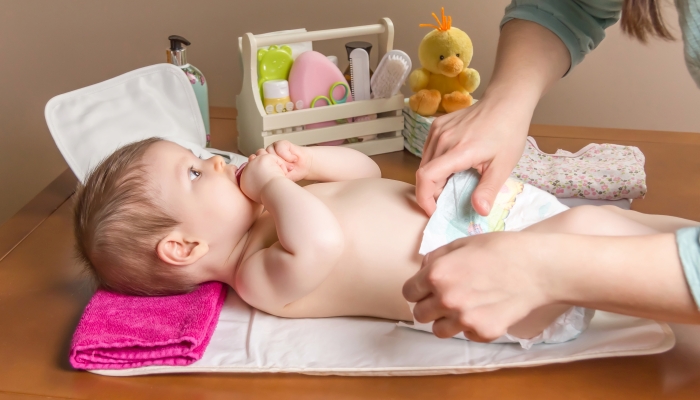
Dealing With Baby Diaper Blowouts At Night
Baby diaper blowouts can happen at night, too. To avoid this, there are a few things you can try.
You might consider using overnight diapers that offer extra absorbency and better protection at nighttime. Or, consider using a cloth diaper cover over your baby’s usual disposable diaper at night. A cloth diaper cover can offer enough absorbent material on top of the diaper to prevent a diaper leak from becoming a full baby blowout.
What Are the Best Diapers to Prevent Blowouts?
Cloth diapers tend to leak less than disposable diapers. Using a cloth diaper cover seems to lead to fewer diaper blowouts because of their extra absorbency versus disposable diapers.
But if you prefer to use a disposable diaper, you may need to experiment with a few brands to find the best diaper for your baby’s shape, size, and activity level.
Many parents are fans of Pampers Swaddlers. They come in a range of sizes and have extra protection at the diaper cuffs to help prevent leaks. For newborns, they have a protective notch for your baby’s belly button while it heals. They also come in an overnight version with more absorbent material to prevent nighttime leaks.
FAQs
Do breastfed babies have blowouts more often?
In general, breastfed babies tend to have more bowel movements than formula-fed babies, especially in the first few months before they start solids. This may lead to a few more baby diaper blowouts.
Changes to a breastfeeding mother’s diet may also result in noticeable changes to her baby’s bowel movements. It’s important to check your baby’s poop for any changes to make sure they are safe, comfortable, and healthy.
Do blowouts mean the diaper is too small?
Different babies may have baby diaper blowouts for different reasons. But the first likely culprit to check is the diaper size you’ve chosen for your baby. If a diaper is too small, it won’t be able to contain your baby’s poop as well as the right size diaper.
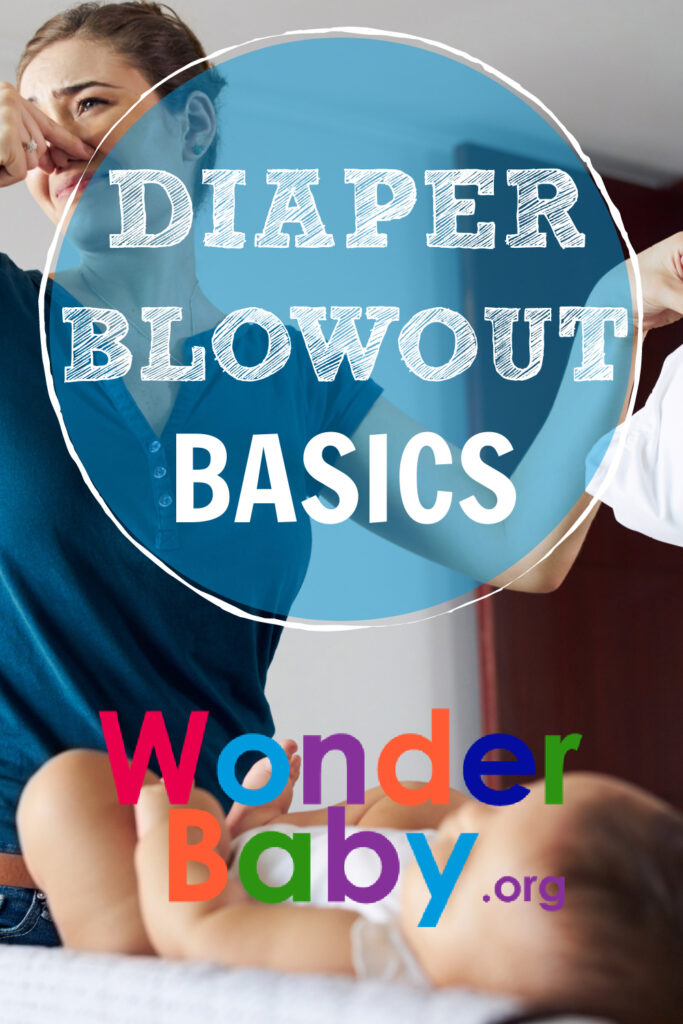
Related Posts
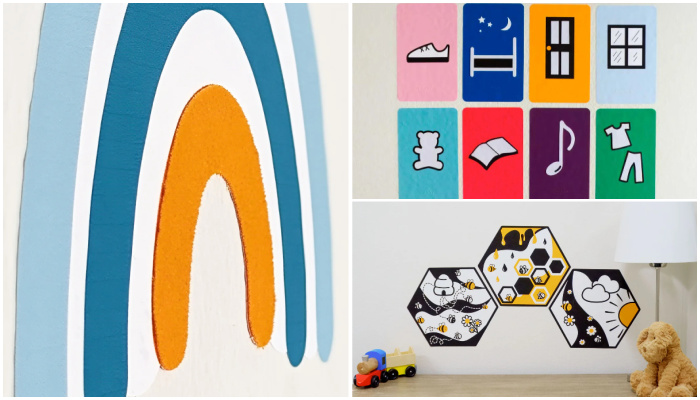
Parenting
Sensory Wall Art: 5 Tips to Create a Room Your Blind or Low-Vision Child Will Love
Even if your child can’t see their surroundings, personalizing and decorating their room with thoughtful, sensory-friendly design can make a big difference in their confidence, independence, and joy.
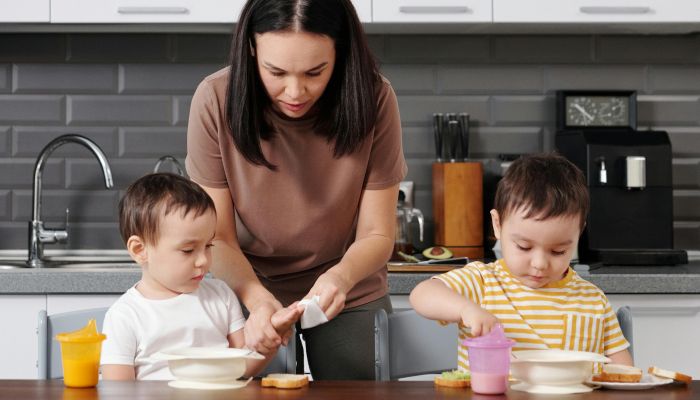
Parenting
4 Tips to Manage Twins Alone as a Single Parent
Taking care of twins alone as a single parent can feel overwhelming. Learn practical ways to help lighten the load.
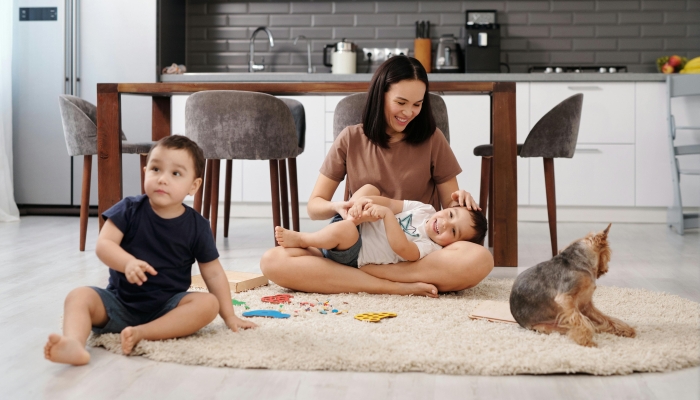
Parenting
How to Manage Twin Escalation Syndrome
Discover effective strategies for managing twin escalation syndrome, including promoting individuality and fostering positive interactions.